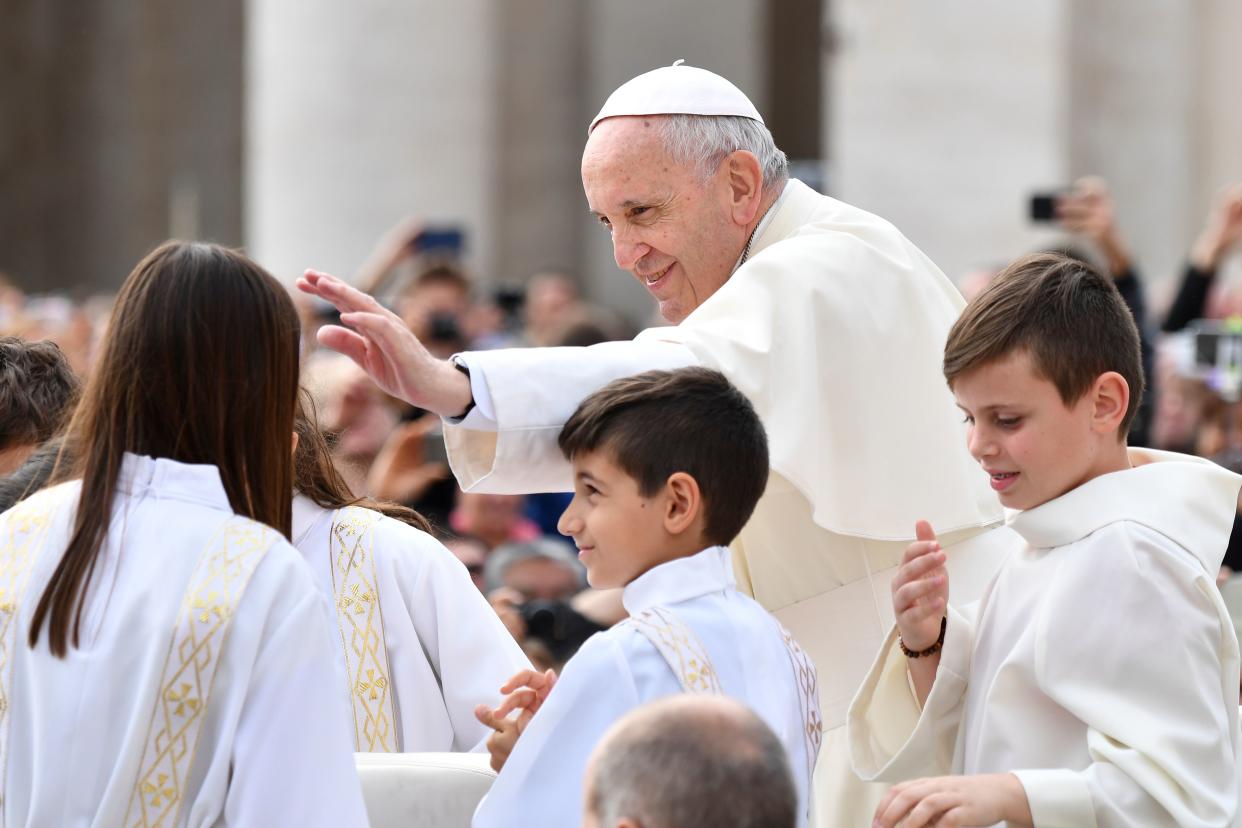'God loves you': How the pope's inclusive comments on homosexuality could change America's Catholic schools

During a recent interview with Spanish newspaper El Pais, Juan Carlos Cruz — a Chilean sex abuse survivor — shared a groundbreaking anecdote from a meeting with Pope Francis. After the pope apologized for the abuse Cruz suffered at the hands of church leaders, Cruz said he opened up to Francis about the trauma that came afterward — being told he was a “perversion” for being gay.
Unexpectedly, the pope responded by affirming his sexuality.
“I told him that I kept my faith and that I try to be a good person and not hurt anybody,” Cruz told El Pais. “He said you have to understand that God made you this way and he loves you. And the pope loves you, and you have to love yourself.” For the head of a church that views homosexuality as a sin, the comment wasn’t just meaningful, it was history-making.
While the Vatican has yet to confirm the statement, Cruz’s account has reverberated across the internet, prompting think pieces from both Conservative Catholic sites and Liberal-leaning ones.
It’s commotion that’s warranted. As supreme pontiff, Pope Francis controls not only Vatican City but the entire congregation of the Roman Catholic Church. His words — when issued officially — have the power to alter the church’s doctrine and reshape the institutions built around it. It’s an exciting prospect that could touch many realms of life but — for future generations — perhaps none more so than education.
At a young age, children in Catholic schools are taught that homosexuality is evil, a disorder, a sin. Pope Francis’s comments, if true, fly directly in the face of this doctrine.

According to a spokesperson for the National Catholic Educational Association (who did not wish to comment on the Pope’s words), Catholic schools fall under the jurisdiction of one of the 176 diocese in the U.S. The dioceses are guided by the United States Conference of Catholic Bishops, which — like individual churches — takes its teachings from a document known as the catechism.
Created by Pope John Paul in 1992, the catechism outlines the church’s stance on everything from marriage to pornography. Homosexual acts, based on this text, are “acts of grave depravity” and are “intrinsically disordered.”
“They are contrary to the natural law,” the Catechism reads. “They close the sexual act to the gift of life. They do not proceed from a genuine affective and sexual complementarity. Under no circumstances can they be approved.”
While the document does ask that Catholics show gay and lesbians “respect” and avoid “unjust discrimination,” the classification of “intrinsically disordered” remains. For the 1.9 million kids enrolled in Catholic schools in the United States, the message is clear: Being gay is unacceptable. It’s no wonder that LGBTQ teachers are regularly fired from Catholic schools or that LGBTQ youth have higher rates of depression and suicide. The message to gay people is one of hatred, and they receive it.
For all of these reasons, and more, the pope’s comments are being seen by those fighting for LGBTQ rights in the church as a small victory. Stanley Zerkowski, executive director of one such nonprofit called Fortunate Families, is one of them. “Words matter. Words can kill; they kill the spirit and they too often are the reason too many young LGBTQ+ sisters and brothers take their lives,” Zerkowski tells Yahoo Lifestyle. “Pope Francis’s words brought new life to [Cruz], for sure, but also to every LGBTQ+ sister and brother who reads or hears them.”
In Zerkowski’s mind, there’s no question that his words will change things. “I believe what we are seeing is an evolution of doctrine,” he says. “As a church, we too often focus on sin and have forgotten that original grace preceded original sin. Every person is created in God’s image and has an inherent dignity that comes from God alone.”

Marianne Duddy-Burke, executive director of Dignity USA (a nonprofit focused on LGBTQ rights), agrees that the statement does have the power to transform thoughts — but she says the Holy See would need to make an official statement. “Any change in teaching or public stance that the [Vatican] takes will definitely have an impact on what kids in Catholic schools are taught,” Duddy-Burke says.
As a gay woman who grew up in an Irish Catholic family, Duddy-Burke understands firsthand how damaging the anti-LGTBQ teachings can be to a child’s development. “Calling it an ‘objective disorder’ is saying that homosexual people are not part of God’s plan for humanity — that we’re essentially defective human beings,” she tells Yahoo Lifestyle. “It’s such a degrading position.”
While the Vatican may still make a statement refuting Pope Francis’s remarks, Duddy-Burke hopes that it will not. In a piece for the Advocate, she eloquently captures why. “Did the pope have any idea of the impact of his remarks? Did he intend to upend decades of official teaching? I hope so,” she writes. “It is long past time for the church’s harmful, even dangerous teachings, to be dismantled. The lives and human rights of people all around the world are at stake.”
Read more from Yahoo Lifestyle:
• Catholics slam Met Gala’s religious-inspired outfits as ‘blasphemous’
• This photo of teens praying on prom night is sparking controversy
• Jay Feely, gun-toting prom dad, sparks an intense debate
Follow us on Instagram, Facebook, and Twitter for nonstop inspiration delivered fresh to your feed, every day.

